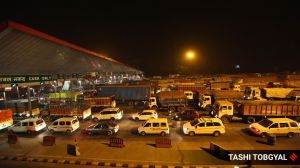OTHER SIDE OF THE RAINBOW
A group of hippies from across the world gather for two months in a forest near Haridwar,away from cities,money and drugs. We listen in on this reclusive assembly
A group of hippies from across the world gather for two months in a forest near Haridwar,away from cities,money and drugs. We listen in on this reclusive assembly
Have you wondered where all the hippies have gone? The dreadlocked folks with chillums? The lungi-wearing,inspiration-seeking and soul-searching bunch? Turns out theyve gone underground. These days,they have maps and by-invite-only policies. They welcome all,and of course love all,but how does one find them?
Through the Rainbow Family of Eternal Light,it seems. And this is no bogus organisation but a continuation of the 1970s counter-culture,a bunch of peace-loving activists who aim to rid the world of war and suffering through free hugs and the like. Its a post-Vietnam movement,one that now spans countries and continents. Now it has arrived in India. The group will park here for two months,from February 28. Five hundred people are expected to gather; 40 people from 11 countries are already in.
Finding the family is no easy task. There is a Facebook group but thats been devoid of activity recently,given the groups rules of no technology. Then,there is the issue of the map. To get that,we track down a guesthouse in Rishikesh along a private white sand beach. On its wall is plastered the map and directions to the getaway.
The map consists largely of rules: we have no leader,we are one,we say no to salt,dont use soap in the Ganga . Then there is also the no shoes rule. Which makes it particularly hard to get to the family since they are down a dirt track 25 km from Haridwar. In a location most villagers have never heard of. But there are random rainbow ribbons hanging from trees to guide one home. Home is in the small Shyampur village,at the base of Sidd Kutti Ashram. No cars are allowed,its a three-hour trek to the Ganga.
The Rainbow Family considers it a primary duty to protect nature,their mother. Wherever they gather,they build communities to live with nature: makeshift tents,kitchens and shit pits. Shelter is tree branches and twigs,tarpaulin and cloth curtains. It gets cold at night. The water drips from the tarpaulin,but this was the way before capitalism tarnished us, says Bennoir,a French truck driver.
Most of the time,family members get along fine but in the early days of a gathering,known as the seed days,it can get problematic. Take for instance,Guy,an Israeli philosophy and history student. Hes trying to build a bridge across the Ganga with a 50-meter rope. Some people are good at building, he says,but Im not. I dont even want to build a bridge,but Ive been told to.
This bridge is part of a larger plan to move to what is referred to as the island,a strip of land across the river. The scout of the group,Josef,found this piece of land. Initially,we will stay on this side and as more people arrive,we will cross over. But by consensus only. For the Rainbow way of life,consensus is key, he says.
For all purposes,they operate as a commune. Food is shared,they eat at the same time and wake together when the moon sets. They divide work among themselves and in order to ensure that it stays communal and good energy,they have the talking stick. Like the conch from The Lord of the Flies ,it is passed from one person to another. It allows everyone to get a chance to speak and express how they feel, says Katya. But not all are keen on this practice. Its time-consuming, says Bennoir.
They also dont do currency,they barter goods instead. After meals and jam sessions,children and musicians walk around the circle collecting monetary donations in the Magic Hat. One member is elected to go to Babylon their name for cities, Haridwar, to get Babylon food. This has worked in Europe. And at the world gathering last year in New Zealand,we collected over 10,000 euros, says documentary film-maker Andrew,who is making a movie on the Kumbh Mela.
It all appears harmonious until a minor scuffle breaks out between family members over hard drugs. Some people dont understand we have a no-drugs and no-alcohol policy. Marijuana grows naturally,it comes from the earth. Thats allowed, says Francois,an architect from France.
Turning people away is on the increase. A lot of people are getting kicked out these days. My friend in the El Salvador Rainbow was asked to leave because she put her cigarette out on the ground, says Frai,who gets by through selling jewellery as she travels. Not littering or disturbing Gaia Mother Earth is a recurring theme. Before each meal,the group stands in a circle chanting,holding hands and kissing after which they bow down. This is a sign a show of attachment to all on this earth, says Josef.
As more arrive,talk of crossing over to the island is rampant. But the babas in the ashram have advised against crossing over the Ganga. The other side is unsafe. Not only because there are wild animals but should something happen,who will be there? Also that land does not belong to the ashram,nor does it have a fresh water source, says Baba Das.
Yet bags have been packed. And despite protests against crossing without consensus,a bold Frenchman who hardly spoke and cooked the most has taken the first step across. So what if there are elephants and tigers and other forms of wildlife out there? We are here to connect with them. If wildlife in Africa didnt stop us,why should it in India? says Katya as she grabs her twins. My kids have never lived within four walls, she says.
When I asked them what appealed most about the island,the most common response was: to get away from Babylons reach,to be away from authority,to be free of control and to act in unison and harmony. Louisa wanted to get away from prying Indians. Some are okay but we cant go naked on this side,the men will go mad, she says.
A majority crossed over on the second day,on the night of the full moon,taking with them most of the food and shelter. Matius,a German,then broke his silence. Its not even an island. Its just more land on the other side of the Ganga. The side that has no clean drinking water. Ive actually been there. Theyre chasing utopia, he said. And then he packed up to head to Babylon.
- 01
- 02
- 03
- 04
- 05































